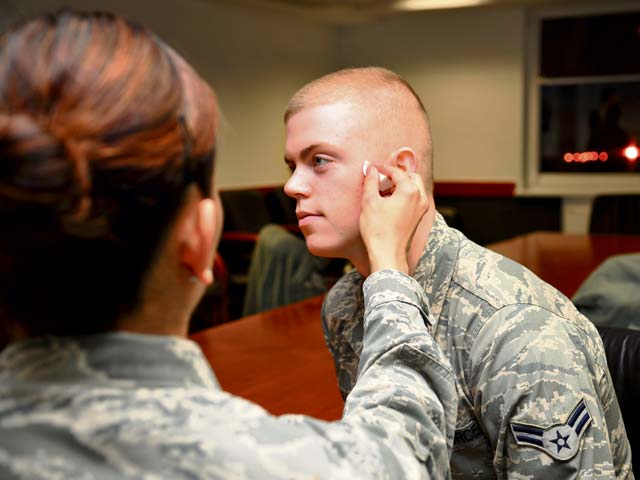
To promote Domestic Violence Awareness Month in October, the Family Advocacy Program on Ramstein arranged a social experiment.
Volunteers from different units came together, put on makeup to signify bruises, cuts and black eyes, and went about their normal day, counting how many people they interacted with who saw the marks but didn’t say anything, as well as those who stepped up to make sure they were alright.
On Oct. 30, the volunteers got together and talked about what they experienced on the day they participated.
“Everybody would stare,” said Airman 1st Class Shayna Woodin, 603rd Air Communication Operations Squadron core systems technician. “I had about 40 people say something and about 100 people who stared and even did a double-take while walking by but didn’t say anything at all. The people who said something were people I worked with or friends outside of work.
“Little kids would point, stare and watch as I walked past at the (Base Exchange),” she continued. “It was extremely awkward having people just stare.”
There is a stigma with domestic assaults where people may think of the victims as being women more often than men. Because of this idea, Staff Sgt. Joseph Lapthorne, 603rd Air and Space Operations Center unit deployment manager, said not a single person thought his girlfriend was the suspect who gave him his “injuries.”
“People who knew me instantly thought I had been in a bar fight,” he said. “My girlfriend’s co-workers saw her and automatically thought, ‘What did Joe do to you?’ Maybe it’s because of my size, but no one suspected she hurt me, but everyone thought I was an immediate suspect.”
While in the shoes of a domestic assault victim, the volunteers said they spent a lot of time thinking about how they would feel if it were real.
Senior Airman Hailey Haux, 86th Airlift Wing Public Affairs photojournalist, said she thought it would be awkward to ask a complete stranger if they were OK. After the experiment, she said she realized how upsetting it was when people didn’t ask if she was alright.
“I went to the BX, Burger King, through the gate to get to work and a few other places,” Haux said. “None of them said anything. There were about seven people in total who said something. The only people who asked were co-workers and people I went to the gym with.”
Some people admit it may be difficult or awkward to approach a complete stranger to make sure they’re safe.
“A co-worker told me he wouldn’t have come up to me on the street to ask if everything was fine,” Haux said. “I was told if we were engaged in a conversation, then he probably would’ve asked if I was a stranger.”
In any community, it’s important to look out for our wingmen. If someone appears to be the victim of an assault, don’t be afraid to ask them if they’re in danger. Refer assault victims to Family Advocacy or a chaplain, so they can get the help they may need.
“When incidents of domestic violence are not reported to authorities, community members become vital in detecting silent victims of abuse,” said Valerie Seitz, 86th Medical Operation Squadron Family Advocacy outreach manager. “When you see people in your community suffering from abuse, whether they are Airmen, dependents or civilians, regardless of gender or rank, we challenge you to reach out to them. Domestic abuse is contrary to everything the military believes in. Simply asking, ‘Are you OK? Can I help you?’ could be the key to saving a life.”
To contact Family Advocacy, call 479-2370 or 06371-46-2370.







